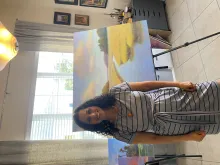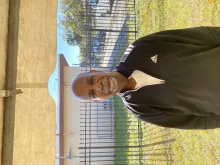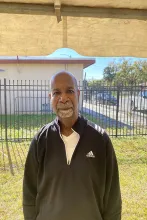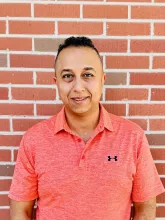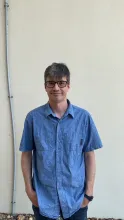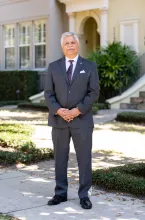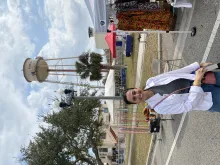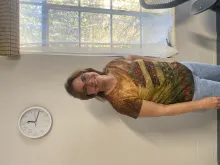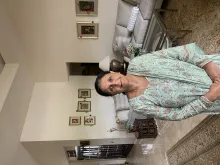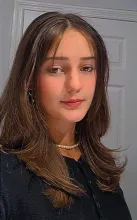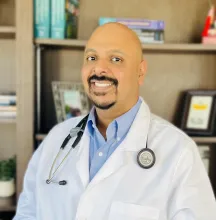Orit Reuben was born in Israel in 1966. She recounted her upbringing in Israel during the 1970s, from visiting her grandparents in their kibbutz to living in a low-middle-class neighborhood. She specifically recollected memories about experiencing the Yom Kippur War in 1973. Her dad served in the Israeli military and moved the entire family to the United States in 1979 as part of his role in the military. Orit recalled the joy and struggles she encountered culturally in her transition from Israel to Minneapolis. At the turn of the 1990s, Orit attended the University of Minnesota, studying computer science despite her deep artistic passions and talents. Mandatory military service as an Israeli citizen interrupted her collegiate experience, and Orit did not continue her computer science degree upon returning to Minneapolis. Instead, she pursued her artistic passion by studying commercial interior design at the University of Minnesota. Orit moved to Orlando, Florida, in 2006 to find better employment opportunities. She explained how the economic recession of 2008-2009 prompted her career move to paint as a self-employed artist full-time, as she volunteered at the Crealdé School of Art in Winter Park, Florida, after losing her job. In addition to broader observations living in Orlando, Orit discussed her painting style, how she interprets Florida through her artwork, and the overall artistic and cultural community she has discovered through her artistic career in Central Florida since 2009.
Desmond A. Reid was born in 1945 and spent the first twenty years of his life in Jamaica. He recounted his formative years in Jamaica, particularly his mother’s influence. He immigrated to the New York City in 1965, printing and selling books primarily on Black literature and heritage. Desmond moved to Orlando in 2009, in which he shifted his bookselling approach from a mainly economic endeavor to a more philanthropic pursuit for the Black community. Desmond has sold books from his Longwood bookstore, DARE, at the Zora Neale Hurston Festival of the Arts and Humanities since 2011, and he explained how the festival has changed over the past decade. Relatedly, Desmond highlighted how race relations more broadly have fluctuated in the US since the late 1960s, from a particularly harrowing incident during his military service to the recent state and national efforts to restrict certain books from schools.
Mina Raky was born in Cairo, Egypt, in 1981. Mina recounted his upbringing in Cairo, specifically the challenges he faced as a religious minority practicing Christianity in a Muslim-majority country. His mom recognized his musical talents at an early age, and he attended the Conservatoire to learn how to play the piano professionally. Mina deepened his musical knowledge once he graduated from Helwan University in Cairo with a bachelor’s in Music Performance. After college, Mina performed Christian worship music and passed out Bibles during his performances. Mina feared for his safety while performing these actions, given his status as a religious minority, and thus fled Egypt, emigrating to the United States, specifically to Maitland, Florida, in 2006. Mina described the similarities and differences in performing Christian worship music in Egypt and the United States. Additionally, Mina discussed how his minority status shifted from religion to ethnicity once he settled in the United States, with the legacies of the September 11th, 2001, terrorist attacks influencing such changes. Realizing that performing music proved ineffective for sustaining a family, Mina returned to school, graduating with a bachelor's degree in mathematics education in 2012, where he merged his passion for teaching with his love of math. Mina recounted his professional career in education, working as a teacher for several schools across Seminole County. In 2022, Mina graduated with a master’s in education leadership from the University of Central Florida, allowing him to serve as an assistant principal in Seminole County for two years. Mina explained his current role of leading the Department of Educational Technology, and how the COVID Pandemic influenced this decision. Lastly, Mina shared his broader observations about Florida and its cultural changes for almost twenty years.
Matthew Peddie was born in Saskatoon, Canada, in 1976. At around a year old, Matthew and his family moved to Christchurch, New Zealand, after a brief stint in England from Canada. Matthew recollected memories of his upbringing in New Zealand, particularly enjoying the various outdoor activities offered by Christchurch's diverse landscape. Matthew attended the University of Canterbury, majoring in English and French. After his undergraduate studies, Matthew worked at a rural and local high school teaching English and French. He realized through this experience that he did not want to pursue a teaching career further. This experience, however, also connected him with a colleague from Japan, which sparked Matthew's interest in the possibility of teaching language abroad in Japan. As a result, from 2001 to 2003, Matthew worked in Niigata, Japan, teaching English to schoolchildren and recounting his personal and professional experiences living in a country and culture completely foreign to him. In 2004, Matthew pursued a master’s degree in journalism from the University of Western Ontario in London, finishing a year later. Matthew explained how his joy with writing and curiosity about the world drew him to study journalism. In 2005, he married his wife, who was from Orlando, and they spent five years in New Zealand before permanently settling in Central Florida. Matthew worked as a journalist at a radio station in New Zealand and continued in that occupation once he arrived in Orlando in 2010. He explained his appeal with radio journalism compared to print and television. Matthew produced several programs for public radio station 90.7 WMFE (now known as Central Florida Public Media) from 2012 to 2022. Since 2022, Matthew has worked for WUSF in Tampa, Florida, although he still lives in Orlando. Matthew detailed his time at WMFE and WUSF, emphasizing his takeaways about Florida, radio’s continued utility, and the current state (c. 2025) of public media. He shared the general reactions he received from his programming. Lastly, Matthew discussed his broader observations about the Central Florida and Tampa Bay regions, their changes, differences, and challenges since 2010.
Khalid Muneer was born in Pakistan in 1951. He recalled his earliest years in Pakistan, particularly the stories his family passed down about the deadly Partition that divided India and Pakistan in 1947. Khalid emphasized how his turbulent migrant experience from India to England motivated him to study a career that ensured financial security and allowed him to travel worldwide. Thus, Khalid worked for an international banking company for seventeen years throughout the 1970s and 1980s, which stationed him across ten countries. He briefly recounted how the larger Cold War affected his professional career, given that he worked and lived in various “Third World” countries. In 1991, Khalid retired from international banking and emigrated to the United States, fulfilling his entrepreneurial desires. Khalid repurposed his deep cultural knowledge from living in several different cultures to serve in public and political positions in Central Florida, including various chambers of commerce, ethnic organizations, and running for US Congressional District Ten in 2022. Khalid underlined the centrality of political representation for minority and underserved communities, fueling his pursuit to serve in the political arena. As he adroitly put it, “If you’re not at the table, you’re going to be on the menu.” Given his profound three-decade experience in Central Florida as a public and private citizen, Khalid discussed extensively the current (c. 2025) conditions of the region, its economic and ethnic contours, its challenges, and what he envisions for Orlando in the next thirty to hundred years.
Maria de las Mercedes Nunez-Salgado was born on June 12, 1972, and grew up in Madrid, Spain. In addition to recounting her time living in Spain and Europe more broadly, Maria mainly discussed her immigrant experience in the United States. Maria spent most of her time in Philadelphia, as she recently (2020) moved to Orlando for work reasons. Maria reflected on her half a decade living in Orlando, sharing her observations and perspectives about the city generally and how it has compared to her time in Philadelphia and Spain. The acculturation process, embracing American culture while maintaining values from home, and the Hispanic community between Philadelphia and Orlando remain among the most central themes during the oral history.
Claudia Menezes was born in Belém, Pará, Brazil, in 1966. She briefly recounted her experiences growing up in Belém, particularly the inspiration she drew from her mother. Claudia initially majored in history, and explained why she selected that field of study and how it informed her approach to tourism, the career she ended up graduating from and working in. She recalled the business she and her sister opened while in college in Brazil. In 1996, Claudia emigrated to Orlando, Florida, “unintentionally.” After deciding to stay in Orlando, Claudia opened a small tourist business that eventually merged with a bus transportation company owned by her husband, Fernando, in 2001. Claudia described the changing entrepreneurial landscape over the past twenty-five years, given her deep knowledge and experiences as a Brazilian small businesswoman. She also discussed Orlando’s cultural diversity, sharing several varied examples from receiving racially charged phone calls while operating her business to feeling embraced by the overall community. Given her personal experience as an immigrant and professional background working in the tourism industry, Claudia contended that multiculturalism remains Orlando’s greatest strength, not the theme parks. Lastly, she highlighted the current state of her business, GoPegasus, and what she envisions for Orlando’s future.
Jasbir Mehta was born in India in 1955. She recounted her upbringing in India, particularly how her family moved around the country frequently, as her father worked for the government. Jasbir also remembered how the transition from colonialism to post-colonial independence affected her early life and family. She particularly recalled stories her family passed down about the 1947 Partition, and how her father “lost everything.” In 1976, Jasbir emigrated to the United States mainly for educational reasons, as she attended the University of Pittsburgh. Despite increasing opportunities for women in India, Jasbir also cited such gender restrictions as circumstances that prompted her to leave the country, and her father to support such a decision. The Foreign Students Office at the University of Pittsburgh assigned Jasbir to live with an American host family, and Jasbir explained how this family introduced her to American culture. During her time in Pittsburgh, Jasbir produced a radio program that featured Indian music for public radio station WBUQ. She described her motives, the evolution, and how people responded to such cultural programming at that time. In 1989, Jasbir moved to Orlando, Florida, and almost immediately established the Asian Cultural Association (ACA). She feared raising her children in a place that lacked organizations that highlighted and promoted Indian culture, and thus created ACA. Jasbir thoroughly discussed how the ACA has changed over thirty-six years, emphasizing several groundbreaking initiatives such as establishing the oldest South Asian Film Festival in North America and partnering with several universities across Central Florida to educate people about Indian culture, including creating the first accredited course in Indian Music in the state of Florida. Through her leadership with the ACA, Jasbir has significantly elevated and supported the Indian community in Central Florida. Given her deep cultural connections, Jasbir shared more broadly how Orlando has changed over the past thirty-six years.
Ania Martynuk was born in Chicago, Illinois, in 2006. A daughter of Ukrainian immigrants, Ania recounted her young life experience, especially navigating her dual identity as a Ukrainian and American living in Florida. She remembered her visit to Ukraine when she was ten years old. She recalled her childhood growing up in Palm Coast, Florida, all through her UCF collegiate experience (at the time of the recording). Ania’s mom, Roksolana Cisyk (part of the FHS Oral History Project collection), serves as one of the central members for the Ukrainian Project Incorporation—the same organization that created and hosted the Annual Ukrainian Festival in Orlando (where the oral history took place). Ania described her observations of the four-year festival and its cultural significance. She also expressed her thoughts about the Russo-Ukrainian War, the state of Florida, and the US (c. 2025), and their futures.
Akshay Manohar was born in New York City in 1986. Only roughly a year old, his family moved to Bombay, India, where Akshay spent most of his formative years. He particularly recollected memories of attending a boarding school in India. After completing the boarding school in 1999, Akshay returned to the United States, specifically Gaithersburg, Maryland, to finish high school. He recounted the various cultural shocks he experienced upon returning to the US as an American-born Indian. He remembered watching the September 11th, 2001, terrorist attacks in high school, and how it felt personal to him along geographical and cultural lines. As a student in a medical careers class, he interned at Bethesda Naval Hospital (now known as Walter Reed National Military Medical Center), witnessing the effects of the subsequent Iraq War. Treating soldiers who returned from the frontlines with gruesome injuries deeply affected Akshay, leading him to pursue a career in medicine—a path he never intended to pursue professionally. Akshay attended Kasturba Medical College in Karnataka, India, with the intention of returning to the United States for his residency and subsequent professional career. In addition to experiencing renewed cultural shock, Akshay described the varied experience of practicing medicine across several places in India. Relatedly, he explained the similarities and differences between the healthcare system in India and the US, especially once he returned and started practicing first across the Northeast and then in Florida. After completing his residency in 2016, Akshay moved to Tallahassee to officially begin his professional career. In 2022, Akshay relocated from North Florida to Orlando, underscoring the cultural differences between the two regions of the state. Throughout the oral history, Akshay emphasized how his constant relocation between the US and India has contributed to his fluid ethnic identity, informing his engagement with and connections to his diverse patient population. Additionally, Akshay highlighted his professional experience as an infectious disease physician during the COVID-19 pandemic and how it has fueled the growing politicization of medicine in America.

